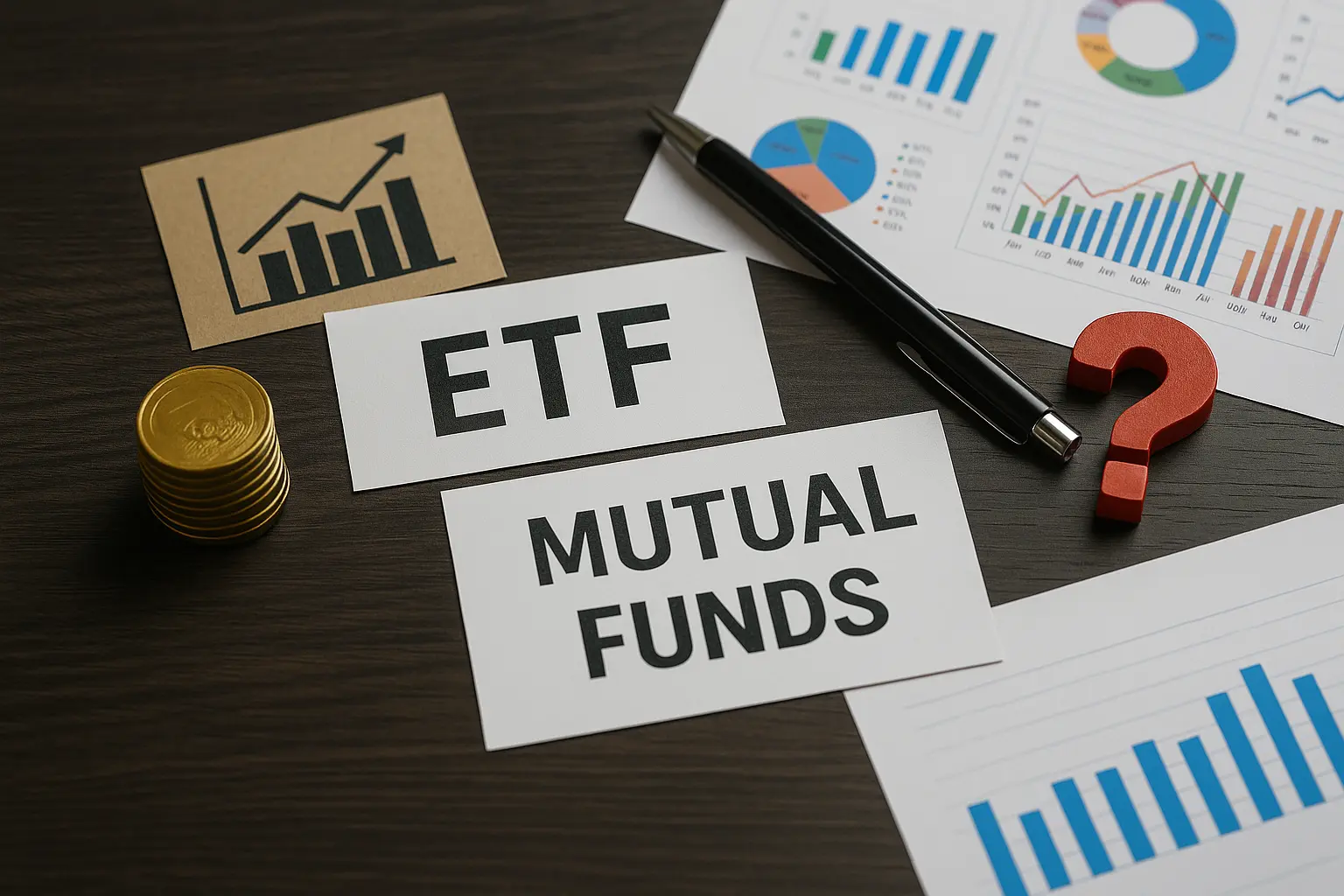Top 5 ETFs vs. Mutual Funds – Where Will You Make More Money in 2025?

Top 5 ETFs Mutual Funds- Where will make more money in 2025?
ETFs (Exchange-Traded Funds) or Mutual funds, you are not sure which one to invest in? Don’t worry! The same question befits many investors. Both of these are widespread as an investment option in the contemporary market, and which of them is preferable is determined by your objectives and investing tendencies.
In this blog, I will discuss in simple terms what ETFs and Mutual Funds are, the Top 5 ETFs to consider in 2025, and make you choose, where to park your money, which will grow faster.
What Are ETFs and Mutual Funds?
- Mutual funds are those funds which a professional investment manager manages your money. Stocks, bonds, or any other assets are picked by the manager to enable you to earn decent returns. You may invest in SIP (Systematic Investment Plan) and lump sum.
- ETFs (Exchange-Traded Funds) resemble mutual funds but they behave like shares. You can purchase/sell ETF products at any time within the hours of the stock market by using Demat account. ETFs tend to follow a given index such as Nifty 50 or Bank Nifty and are cheaper than mutual funds.
The Reasons why ETFs are on the Rise?
- Minimal cost ratio (0.05 percent to 0.75 percent).
- You are able to purchase/sell them in market as and when you wish.
- Transparent- you are aware where your money is invested.
- Suits best to a long term passive investing.
Top 5 ETFs to Invest in 2025
In case you are thinking of investing in ETFs, the choice of the ETF is very crucial towards improved returns and stability of your portfolio. The Top 5 ETFs in 2025 are listed below in detail with a description so that you get to pick the right one:
1. Nippon India Nifty 50 ETF
It is among the most famous ETFs in India and is deemed to be perfect when it comes to beginners. It is invested in the 50 best firms in India belonging to the Nifty 50 index. These will be firmly established firms of the sectors such as IT, banking, pharma, FMCG, etc.
- Why to Invest:
It is low risk since it is a stable return since it is pegged on the market index. It is ideal when one wants to invest in economic growth of India without having to select which individual stocks to invest in. - Expense Ratio: approximately 0.05% equalling near-zero fees in comparison to mutual funds.
- Ideal For: Long-term investors, beginners and passive investors.
2. SBI Nifty Bank ETF
This ETF has been investing only on the best banking stocks of India such as HDFC Bank, ICICI Bank, Kotak Mahindra Bank, Axis Bank, and State Bank of India.
- Why to Invest:
This is a sector-specific ETF that has the potential to achieve higher returns compared to when you invest in general index ETFs in case you feel that banking sector of India is going to grow rapidly in the years to be followed. - Expense Ratio: estimate about 0.10 per cent-very economical.
- Ideal For: People who want to have better returns basing on selections in sectors (banking).
- Important Note: ETFs in the banking sector have a little more risk associated with the banking sector of the economy in comparison with Nifty 50 ETFs because of the possibility of a decline in returns due to business-specific factors.
3. ICICI Prudential Nifty Next 50 ETF
This ETF invests in the companies that are ranked next in line to Nifty 50- also qualified to be referred to as Nifty Next 50. These are large and middle size companies, which can be inducted in Nifty 50 in future.
- Why to Invest:
Such businesses tend to be on their growth-stage thus they can deliver quicker in terms of returns as compared to Nifty 50. There is opportunity to invest in the next big businesses in India through this ETF. - Expense Ratio: 0.15 %.
- Ideal For: Investors who want a greater growth potential and a relatively greater risk but than Nifty 50 ETFs.
4. Motilal Oswal Nasdaq 100 ETF
This ETF is ideal in the event that you desire world-wide diversification. It invests in the 100 leading non-financial firms in the United States of America cited in the Nasdaq stock listing. This comprises super giants such as Apple, Microsoft, Amazon, Google, among Meta, etc.
- Why to Invest:
When you invest in this ETF, you can enjoy the prosperity of the US technology and innovation sector without any foreign investment account. - Expense Ratio: It is approximately 0.50 percent which is quite expensive compared to Indian funds, but decent by the international standard.
- Important Tip: This ETF is subject to the fluctuations of the US economy, so its returns may change in tandem with the currency rates.
5. UTI Gold ETF
This ETF gives you to the opportunity to invest in gold, without the need to purchase physical gold. The returns of the ETF are pegged to the prices of the gold in India.
- Expert Tip: Have approximately 5-10 percent of your portfolio in gold to mange the risk.
- Why to Invest:
Gold is listed as a available harbor in the time of market drops or great inflammations. Investing in gold will add stability to your portfolio as well as diversify it. - Expense Ratio: Around 0.35%.
- Ideal For: Investors seeking a protection on stock market fluctuation and inflation.
Mutual Funds vs. ETFs – Which Is Better?
Now, the main question: Where will you make more money – in ETFs or Mutual Funds?
Let’s compare both options:
| Feature | Mutual Funds | ETFs |
|---|---|---|
| Expense Ratio | 1% to 2.5% | 0.05% to 0.75% |
| How to Invest | Through AMC or apps (SIP/Lump sum) | Via Demat account, like buying stocks |
| Trading Time | Only once a day (NAV) | Anytime during stock market hours |
| Who Manages Money? | Professional Fund Manager | Passive (usually index-based) |
| Returns | Depends on fund manager’s skills | Follows index returns |
| Transparency | Monthly or quarterly | Daily |
Which of the Selections Will Make Your Money Go Faster?
ETFs will suit you better in case you need cheap, consistent returns. Being able to track an index, they are also very low-priced making ETFs the type of funds that can outperform numerous active mutual funds in the long-run.
However, in case you desire professional management or would rather prefer investing through SIP you can still opt for Mutual Funds. Albeit, there are some active managed funds which may emit a little higher returns in case the fund manager acts well but it is not mandatory.
To the long-term investors, particularly the first-time investors, ETFs such as Nifty 50 ETF or Nifty Bank ETF can be an intelligent option because they are simple, cheap and provide significant returns through tracking autonomously with leading companies.
What is the best Investment Strategy until 2025?
II think that the best results can be obtained with the combination of both options:
- Invest in good mutual fund on regular basis through SIP.
- IPassive create wealth by investing lump sum in Nifty 50 ETF or Bank ETF.
In this manner, you can reap both advantages mutual fund convenience and low-cost increase of ETF.
Final Words: Where to Invest?
- And, in case you are a novice and prefer your investment to be smooth, easy and extra convenient- Then go ahead and opt for Mutual Funds through SIP.
- In case you can deal with Demat account and you prefer lower costs and direct control- go ETF.
- To be serious, invest in both when building wealth over a long term.
Both the Mutual Funds and the ETFs are good tools to remember. The fact is thereby early investment, round regular investment and long term endurance.
Still Confused?
Attach your questions in comments! I will assist you in the selection of the appropriate investment effort.
Stay tuned in this blog to find more easy investing tips!


2 thoughts on “Top 5 ETFs vs. Mutual Funds – Where Will You Make More Money in 2025?”